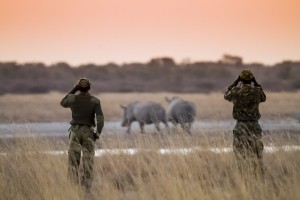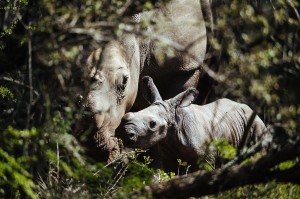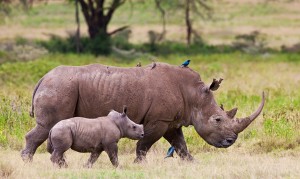 < Pic by Stew Nolan[/caption]Rangers form the frontline in protecting our natural heritage for future generations. Their work is often dangerous, difficult, unappreciated, unrecognized, and unknown. Rangers dedicate their lives to protect what is not theirs, but ours and those to come. World Ranger Day, which is recognised by the International Union for Conservation of Nature (IUCN) on the 31st of July, is a chance to celebrate the wonderful work that Africa’s rangers do.
Many rangers lose their lives whilst protecting our natural heritage, whether it is due to sickness, fire, animal related death or increasingly to armed skirmishes with poachers. According to the International Ranger Federation (IRF) Roll of Honour, 52 rangers have been reported as having lost their lives in the line of duty in the last 12 months. Sean Willmore, President of the IRF, says that the vast majority have been killed by poachers or armed militia. While the IRF has been monitoring ranger deaths since 2000, “unfortunately the actual number of deaths is estimated to be two to three times higher as not all ranger deaths, particularly in Africa are recorded,” Willmore notes.
< Pic by Stew Nolan[/caption]Rangers form the frontline in protecting our natural heritage for future generations. Their work is often dangerous, difficult, unappreciated, unrecognized, and unknown. Rangers dedicate their lives to protect what is not theirs, but ours and those to come. World Ranger Day, which is recognised by the International Union for Conservation of Nature (IUCN) on the 31st of July, is a chance to celebrate the wonderful work that Africa’s rangers do.
Many rangers lose their lives whilst protecting our natural heritage, whether it is due to sickness, fire, animal related death or increasingly to armed skirmishes with poachers. According to the International Ranger Federation (IRF) Roll of Honour, 52 rangers have been reported as having lost their lives in the line of duty in the last 12 months. Sean Willmore, President of the IRF, says that the vast majority have been killed by poachers or armed militia. While the IRF has been monitoring ranger deaths since 2000, “unfortunately the actual number of deaths is estimated to be two to three times higher as not all ranger deaths, particularly in Africa are recorded,” Willmore notes.
 Indeed, there is no doubt that there are countless others whose tragic deaths have gone unrecorded. The Game Rangers’ Association of Africa (GRAA) asks the international community to join us in saluting these brave men and women who have paid the ultimate price for conservation by celebrating their lives and indeed their calling on World Ranger Day.
Indeed, there is no doubt that there are countless others whose tragic deaths have gone unrecorded. The Game Rangers’ Association of Africa (GRAA) asks the international community to join us in saluting these brave men and women who have paid the ultimate price for conservation by celebrating their lives and indeed their calling on World Ranger Day.
Due to the current epidemic of poaching of rhino, elephant and other iconic African species, rangers are increasingly finding themselves in combat situations – and paying a significant price for this. The effects of this epidemic are not only grievous, but detrimental to rangers’ well-being. Rangers are expected to go beyond their typical role as conservationists to become active players in guerrilla warfare, putting their lives in constant jeopardy. Rising incidents of post-traumatic stress disorder (PTSD), acute stress disorder and burnout fatigue are just some of the effects rangers have to endure as a result of this ongoing assault on our natural heritage. The GRAA has recognised this as a priority area of work and is collaborating with experts in the fields of emotional and psychological well-being.
Added to this, the effects on rangers’ families are a reality many outside of this war do not consider. These families often live in fear, not only for the lives of their loved ones, but also for their own. Such stress puts major strain on rangers’ families and their ability to maintain a healthy family environment. This is an additional stress Africa’s rangers have to endure.
 “The ability to secure our natural resources is already constrained. The cumulative effects of the current poaching situation on the continent to rangers have the real possibility to lead to an attrition rate which is not sustainable,” says Chris Galliers, Chairman of the GRAA. “Such sustainability is only going to come about through increased ranger support and we feel both private and state organisations have to do more to address this.” In the current climate, we cannot afford to have rangers not operating at optimal levels. Rangers’ well-being is not a luxury, it is an imperative. It is high time that adequate support is offered to safeguard our rangers who are the only thing standing between poachers and Africa’s iconic species. They are waging a war that is relentless, unforgiving and uncompromising in nature that is taking its toll physically and emotionally. The GRAA is committed to increasing the necessary support systems rangers so desperately need, but that they are not always getting.
“The ability to secure our natural resources is already constrained. The cumulative effects of the current poaching situation on the continent to rangers have the real possibility to lead to an attrition rate which is not sustainable,” says Chris Galliers, Chairman of the GRAA. “Such sustainability is only going to come about through increased ranger support and we feel both private and state organisations have to do more to address this.” In the current climate, we cannot afford to have rangers not operating at optimal levels. Rangers’ well-being is not a luxury, it is an imperative. It is high time that adequate support is offered to safeguard our rangers who are the only thing standing between poachers and Africa’s iconic species. They are waging a war that is relentless, unforgiving and uncompromising in nature that is taking its toll physically and emotionally. The GRAA is committed to increasing the necessary support systems rangers so desperately need, but that they are not always getting.
On World Ranger Day we therefore call on African governments, conservation management agencies and the private sector employers of rangers to provide emotional support and care for these formidable protectors of our wildlife. The truth in this ugly reality is that without a motivated, invigorated ranger corps, Africa’s conservation efforts will be doomed to fail.